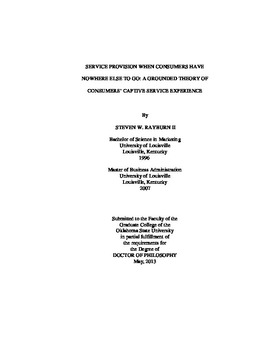| dc.contributor.advisor | Brown, Tom J. | |
| dc.contributor.author | Rayburn, Steven W., II | |
| dc.date.accessioned | 2014-09-24T14:16:42Z | |
| dc.date.available | 2014-09-24T14:16:42Z | |
| dc.date.issued | 2013-05 | |
| dc.identifier.uri | https://hdl.handle.net/11244/10983 | |
| dc.description.abstract | In this research, I propose that while typical service consumers might anticipate fulfillment of their needs and desires coupled with positive service outcomes, consumers of captive services may instead experience service captivity and several other negative outcomes in their service experiences. Captive services are those services that operate with structures and processes that, to varying degrees, limit consumer choice, control, or power. Service captivity refers to a consumer's perception that s/he has no options for obtaining a needed service other than the current provider. While it is often suggested that firms actively manage the service delivery process to improve consumers' service experience perceptions, in captive services power imbalance in favor of the organization can short-circuit the need to do so. The result of this power imbalance is consumer feelings of service captivity. As a result consumers are thought to experience service deficiencies untenable in typical service contexts. | |
| dc.description.abstract | To explore these possibilities, a qualitative study is performed. Specifically a grounded theory is developed of consumers' captive service experience. Findings suggest captive service exists and consumers feel service captivity. In this it is found that service concepts seen vital in prior service research do not manifest or manifest differently in a context of captive service. Consumers' service experience is colored by power imbalance in favor of providers. Felt dependency further leads to feelings of powerless and dehumanization. The burden of managing interactions emotionally, relationally, and procedurally shifts to consumers. These outcomes notwithstanding consumers attempt to exert their influence in service interactions, thereby taking back some control of the service experience. | |
| dc.description.abstract | Findings in this study expose that providers are sometimes in control rather than the implicitly held notion that consumers always have power in service exchanges. Understanding of "service" in such captive services is provided. Ultimately, the negative outcomes for consumers of this shift in power is delineated and interpreted in relation to existing literature. | |
| dc.format | application/pdf | |
| dc.language | en_US | |
| dc.rights | Copyright is held by the author who has granted the Oklahoma State University Library the non-exclusive right to share this material in its institutional repository. Contact Digital Library Services at lib-dls@okstate.edu or 405-744-9161 for the permission policy on the use, reproduction or distribution of this material. | |
| dc.title | Service provision when consumers have nowhere else to go: A grounded theory of consumers' captive service experience | |
| dc.contributor.committeeMember | Mason, Marlys J. | |
| dc.contributor.committeeMember | Arnold, Todd James | |
| dc.contributor.committeeMember | Blum, Denise F. | |
| osu.filename | Rayburn_okstate_0664D_12738.pdf | |
| osu.accesstype | Open Access | |
| dc.type.genre | Dissertation | |
| dc.type.material | Text | |
| thesis.degree.discipline | Marketing | |
| thesis.degree.grantor | Oklahoma State University | |
